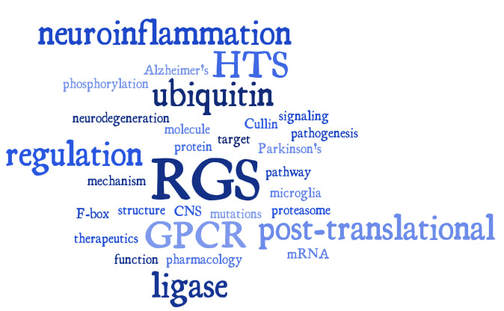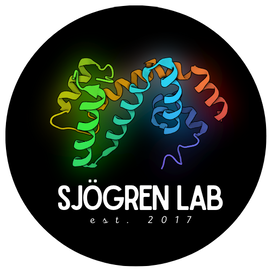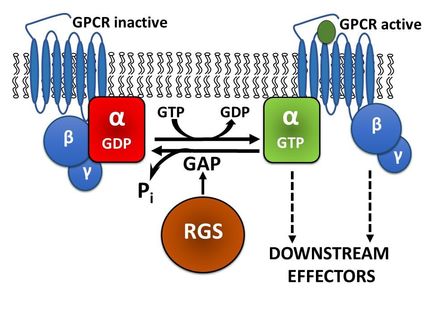Mechanisms of RGS protein regulation

G protein-coupled receptors (GPCRs) represent the largest family of receptors and are important drug targets with 40-60% of currently FDA approved drugs targeting the receptors themselves or downstream mechanisms. One important regulatory mechanism of G protein signaling is mediated through a family of GTPase accelerating proteins, Regulator of G protein Signaling (RGS) proteins. RGS proteins modulate GPCR signaling by binding to and accelerating GTP hydrolysis on active Gα subunits of heterotrimeric G proteins. This results in attenuation of duration and amplitude of GPCR signaling. The majority of the more than 20 RGS proteins identified to date also possess additional functions not related to their canonical effect on G proteins. In the past 20 years, RGS proteins have emerged as novel drug targets in numerous disease states, such as hypertension, cancer and Parkinson disease among others. RGS proteins are tightly regulated through transcriptional, epigenetic and posttranslational mechanisms, such as degradation through the ubiquitin-proteasomal pathway. Furthermore, expression of RGS proteins is often altered during pathogenesis, causing dysregulation in GPCR signaling, that can cause or worsen the disease. Thus, the work in our lab is focused on two central questions:
|
The canonical action of RGS proteins. In its inactive state, Gα is bound to GDP. Upon receptor activation, GDP is exchanged for GTP, Gα dissociates from Gβγ and both can mediate signaling cascades. RGS proteins bind to GTP-bound Gα, accelerates GTP hydrolysis and effectively reducing amplitude and duration of GPCR signaling.
Adapted from: Sjögren B (2017) The evolution of RGS proteins as drug targets – 20 years in the making. IUPHAR Review 21. Br. J. Pharmacol. 174(6):427-437. |
News
July 2023
The Sjogren Lab has relocated to the Department of Pharmaceutical Sciences at UC Irvine! We are excited for this new chapter for the lab!
May 2023
Graduate student Harrison McNabb has successfully defended his PhD thesis and is off to new adventures at NIDDK as a Postdoctoral Research Fellow. We wish him the best of luck!
March 2023
Graduate student Shwetal Talele has received an ASPET travel award to attend the ASPET annual meeting! The Sjogren lab will represent with 3 posters in St Louis, MO, May 18-21. Hope to see you there!
December 2022
Graduate student Qian Zhang successfully defended her thesis and is the first graduate of the Sjogren lab! Congratulations, Dr. Zhang! She will move to Long Island, NY, to start a position as Project Manager at Creative Biogene.
August 2022
The Sjogren lab has received the first R01 from NIGMS!!! In this project we will study how RGS2 is regulated by posttranslational mechanisms.
Grad student Harrison McNabb has received the MCMP Endowment Fellowship! Congrats, Harrison!
June 2022
We welcome Phillip Rushton, PhD, to the lab as a postoctoral fellow! Phillip is a graduate of the PULSe program and will work on the structural aspects of RGS2 protein degradation. We also welcome back our former Lab tech Sadikshya Aryal as a PULSe graduate student. Sadikshya will work on mechanisms and drug discovery efforts in the RGS2 protein degradation project.
April 2022
Our paper describing that RGS2 can suppress Uveal Melanoma cell growth is out in JBC! Check it out!
February 2022
MCMP Grad student Qian Zhang has received a travel award from ASPET (The American Society for Pharmacology and Experimental Therapeutics)! This will be used to attend Experimental Biology 2022. Congratulations, Qian!
January 2022
We welcome 1st year MCMP graduate student Shwetal Talele to the lab! Shwetal will work on the RGS10 project and bring a bioinformatic angle! We also welcome back our former Lab tech Sadikshya Aryal as a PULSe rotation student! Happy to have you back, Sadikshya!
February 2021
Dr. Sjogren has been elected Chair-elect for the Division of Drug Discovery and Development in ASPET (The American Society for Pharmacology and Experimental Therapeutics). She will start this position July 1st and become Division Chair July 1st 2022!
December 2020
The Sjogren Lab welcomes "new" graduate student Stephanie Gonzalez as a first year MCMP student! She comes to us from, well, us! She has previously worked in the lab as a lab tech! Good luck in grad school, Stephanie!
September 2020
Busy month in the Sjogren Lab! Our review on RGS2 functions AND our paper on FBXO44-mediated targeting of RGS2 for degradation got accepted on Sep 8 and 17, respectively! Congrats to Harrison, who is the first author on both papers and all co-authors, Stephanie, Qian and Christine for your hard work!
July 2020
We welcome Sadikshya Aryal as the newest member of the lab! Sadikshya started a position as an Associate Laboratory Technician on July 6th, and comes to us from the University of Kansas.
July 1st, 2020
The lab has an opening for a talented Postdoc to take on the structural aspects of RGS2 protein degradation!
June 10th, 2020
The Sjogren Lab has reopened! We are using social distancing, masks and extensive cleaning to keep everyone healthy.
March 2020
The Sjogren Lab has unfortunately have to shut its doors due to the COVID-19 pandemic. We keep on working remotely and hope to return to campus soon!
January 2020
Happy New Year! Sabiha Chowdhury has joined the lab as a 1st year MCMP graduate student. Sabiha comes to us from the University of Dhaka, Bangladesh.
October 2019
The Sjogren Lab joined the Trader lab for the annual Halloween pumpkin carving party!
July 2019
We are celebrating our first research grant from the NIH! The lab received a two-year R21 grant from the National Institute of Aging entitled: “Assay development and screening for small molecule RGS10 regulators to target neuroinflammation”.
The Sjogren Lab has relocated to the Department of Pharmaceutical Sciences at UC Irvine! We are excited for this new chapter for the lab!
May 2023
Graduate student Harrison McNabb has successfully defended his PhD thesis and is off to new adventures at NIDDK as a Postdoctoral Research Fellow. We wish him the best of luck!
March 2023
Graduate student Shwetal Talele has received an ASPET travel award to attend the ASPET annual meeting! The Sjogren lab will represent with 3 posters in St Louis, MO, May 18-21. Hope to see you there!
December 2022
Graduate student Qian Zhang successfully defended her thesis and is the first graduate of the Sjogren lab! Congratulations, Dr. Zhang! She will move to Long Island, NY, to start a position as Project Manager at Creative Biogene.
August 2022
The Sjogren lab has received the first R01 from NIGMS!!! In this project we will study how RGS2 is regulated by posttranslational mechanisms.
Grad student Harrison McNabb has received the MCMP Endowment Fellowship! Congrats, Harrison!
June 2022
We welcome Phillip Rushton, PhD, to the lab as a postoctoral fellow! Phillip is a graduate of the PULSe program and will work on the structural aspects of RGS2 protein degradation. We also welcome back our former Lab tech Sadikshya Aryal as a PULSe graduate student. Sadikshya will work on mechanisms and drug discovery efforts in the RGS2 protein degradation project.
April 2022
Our paper describing that RGS2 can suppress Uveal Melanoma cell growth is out in JBC! Check it out!
February 2022
MCMP Grad student Qian Zhang has received a travel award from ASPET (The American Society for Pharmacology and Experimental Therapeutics)! This will be used to attend Experimental Biology 2022. Congratulations, Qian!
January 2022
We welcome 1st year MCMP graduate student Shwetal Talele to the lab! Shwetal will work on the RGS10 project and bring a bioinformatic angle! We also welcome back our former Lab tech Sadikshya Aryal as a PULSe rotation student! Happy to have you back, Sadikshya!
February 2021
Dr. Sjogren has been elected Chair-elect for the Division of Drug Discovery and Development in ASPET (The American Society for Pharmacology and Experimental Therapeutics). She will start this position July 1st and become Division Chair July 1st 2022!
December 2020
The Sjogren Lab welcomes "new" graduate student Stephanie Gonzalez as a first year MCMP student! She comes to us from, well, us! She has previously worked in the lab as a lab tech! Good luck in grad school, Stephanie!
September 2020
Busy month in the Sjogren Lab! Our review on RGS2 functions AND our paper on FBXO44-mediated targeting of RGS2 for degradation got accepted on Sep 8 and 17, respectively! Congrats to Harrison, who is the first author on both papers and all co-authors, Stephanie, Qian and Christine for your hard work!
July 2020
We welcome Sadikshya Aryal as the newest member of the lab! Sadikshya started a position as an Associate Laboratory Technician on July 6th, and comes to us from the University of Kansas.
July 1st, 2020
The lab has an opening for a talented Postdoc to take on the structural aspects of RGS2 protein degradation!
June 10th, 2020
The Sjogren Lab has reopened! We are using social distancing, masks and extensive cleaning to keep everyone healthy.
March 2020
The Sjogren Lab has unfortunately have to shut its doors due to the COVID-19 pandemic. We keep on working remotely and hope to return to campus soon!
January 2020
Happy New Year! Sabiha Chowdhury has joined the lab as a 1st year MCMP graduate student. Sabiha comes to us from the University of Dhaka, Bangladesh.
October 2019
The Sjogren Lab joined the Trader lab for the annual Halloween pumpkin carving party!
July 2019
We are celebrating our first research grant from the NIH! The lab received a two-year R21 grant from the National Institute of Aging entitled: “Assay development and screening for small molecule RGS10 regulators to target neuroinflammation”.
To develop a complete mind: study the science of art; study the art of science. Learn how to see. Realize that everything connects to everything else.
Leonardo da Vinci

